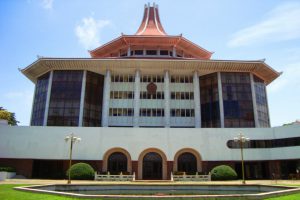Supreme Court of the Democratic Socialist Republic of Sri Lanka: A Full Bench of L.T.B. Dehideniya, S. Thurairaja and E.A.G.R. Amarasekara, JJ. contemplated a matter of an Application under Article 17 and 126 of the Constitution of Sri Lanka, where the petitioner argued for his Fundamental Rights which were violated by the State.
Minimal facts relevant for the proper appreciation are that the petitioner felt discriminated for the appointment of Assistant Superintendent of Police on the basis of his marital status under Article 12(1). He applied for the post of A.S.P. and succeeded in the written exam as well as the interview. Subsequently, before the final interview, he solemnized his marriage. Before the final appointment was given, the Petitioner had contracted his marriage. When he submitted his marriage certificate, authorities had disqualified for selection.
The petitioner had submitted two important matters to be adjudicated, first that whether such rejection on the basis of marital status is unconstitutional and in violation of inter-alia the equality which is guaranteed, second that In any event, whether there was a prohibition at all, for married persons to be denied the appointment. He relied on the International Covenant for Civil and Political Rights (ICCPR), Constitution and General Marriages Ordinance which protects such right to get married. Reference to U.S.A and Nigeria was placed upon by the petitioner to which the Supreme Court stated that, “Here, we basically followed the discipline in the military services from British with more specialization in domestic values. Hence, the order of discipline in uniformed services cannot be easily compared with other jurisdictions”.
The Attorney General for Sri Lanka stated that the classification was based on rational and disciplinary matters of uniformed services, it was for the better training of the officers. The Respondents submitted that, the Petitioner had applied on an advertisement published in Gazette according to the said Gazette; the Open Competitive Examination for the Selections of Assistant Superintendent of Police was called under several categories. Among many, one of the requirements was to be unmarried. Except for the Ordinary Police Service Category at other positions are more technical and specialized in a certain field of work. Further, it was observed that, those are open to female candidates too. The reason quoted for such condition was, ‘Ordinary Police Service category’ was in charge of the law and order, which obviously needed strenuous physical and weapon training, hence the appointing authorities had specified that, these candidates should be unmarried with less or no family commitment for the purpose of training. Further they relied on Air India v. Nergesh Meerza, (1981) 4 SCC 335, where the Supreme Court of India held that, “Based on reasonable classification that requiring air hostesses to be unmarried for period of four years after getting employment was not a violation of the equality provision, however, that requiring them to leave employment after having children was against the equality provision.”
The petitioner bought an argument that the word “candidate” was not to be applied to Petitioner, because he was already selected, hence his status of marriage should not be questioned. The requirement of unmarried was for the purpose of training after the appointment. Therefore requirement was applicable until the conclusion of selection, training and the probation period or until the period specified by the appointing authority.
In view of the above, the Court found that there was no discrimination by the State and such condition was well drafted for the specified post. Hence it was held that no violation of the Fundamental Right of the petitioner.[Rubasin Gamage Indika Athula v. Inspector General of Police, 2019 SCC OnLine SL SC 4, decided on 07-06-2019]

